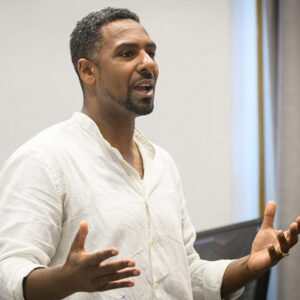“Being at Carolina in the early to mid-1990s was a very interesting time. There was a lot of activism among students and my peers, especially in African American student unions. It was great to see how the institution changed under the pressure of students.”

This moment of student activism also shaped Carolina’s world of sports. Female athletes and women’s teams benefited from a significant push from students in the 1990s. As a result of this student-driven movement to challenge authorities, “the lacrosse women’s team became a powerhouse at UNC, a phenomenal success.” As Power-Greene points out, UNC at that time was a mirror of many such movements across the United States.
Even students who were not actively involved in the protests, like Power-Greene, became interested in the issues that people on the street were fighting for. He went to the library and picked up books about black intellectual and political history, including biographies of Black leaders like Malcolm X. “I met with Black scholars at UNC, the first academic professionals who saw my potential.” Mentors in the History Department were especially crucial in making Power-Greene the person and scholar he is today. Among them was Colin Palmer, the first Black chair of the History Department, whose love for teaching inspired Power-Greene a lot. “Palmer lectured without notes and then he drew this map of the Atlantic World on the board out of his head.”
Genna Rae McNeill stands out from all the people in Power-Greene’s college experience. She continuously challenged and nurtured his talents as a scholar and writer. “I still remember how she criticized the first paper. I am a good speaker, she said, but not a good editor. Writing is hard.” Even today, as a tenured professor, he looks back to his mentors at UNC for inspiration and guidance: “Over 30 years passed, and I still have my notebooks and papers from Carolina.”
In both his teaching and research, Power-Greene continues this legacy from Carolina, focusing on African American internationalism and comparative studies of social and political movements. Based on his dissertation from the University of Massachusetts Amherst, Power-Greene’s Against the Wind and Tide: the African American Struggle Against the Colonization Movement (New York University Press, 2014) describes the fight of Black Americans in the North and Midwest against resettlement plans that aimed at sending free Blacks to Liberia, depriving them of their equal rights.
Even though he became a successful historian, Power-Greene reminds students that “they don’t need to be stuck in a box.” Growing up in a predominantly white suburb of Westchester, New York, his journey to Carolina was “rather untypical.” As a successful athlete, he went to UNC because it was “the best athletic and academic school in the country.” As a midfielder on the UNC Men’s Lacrosse team, he played on two conference championship teams and made a final four run. “I was into different sports. I played basketball for a long time, then lacrosse. And today, I am still coaching kids, including my daughter, all kinds of sports. I love working with young adults.”
Power-Greene motivates young people to explore their interests and strives to promote intersections in life. For him, the paths did not only cross the worlds of athletics and arts, but also fiction and academic scholarship. During his time at Carolina, he discovered his talent for creative writing in a class on poetry with James Seay. “Even though he was a traditionalist, he liked my poems and was very supportive. We are still in touch.” He made Power-Greene aware of the importance of fiction and storytelling.
Many years later, this passion for creative writing resulted in Power-Greene’s first historical novel, The Confessions of Matthew Strong (Penguin Random House, 2022). Described on NPR as the “best book of the year,” it tells a fictional story of a philosophy professor who was kidnapped by a white supremacist at her home in Birmingham, Alabama. After discovering that her kidnapper has been abducting other black girls in hopes of inciting a revolution, she and her community plan to outsmart the kidnapper. “The big question of the novel is: how do Black communities come together when there is a threat to their existence,” as Power-Greene explains. The idea for the novel emerged during his graduate studies at UMass, at a time when Obama became president and racial violence escalated once again in the country. “The response to the novel and seeing people being engaged in conversation through my art was very rewarding.”
Ousmane Power-Greene reinvented himself throughout his life and in his different roles as scholar, educator, novelist, and athlete. The scholars and peers at Carolina paved the road he took, sparked his intellectual creativity, and made him aware of his potentials. It is a journey that he is still taking and learning from: “For a long time, I did not embrace my potential as a writer and an academic professional. I learned to talk about my creative side to my colleagues. Their positive responses overwhelmed me. It is important to keep in mind that you can always change your story. Nothing is static.” It’s an important message to future generations.
-Oskar Czendze
